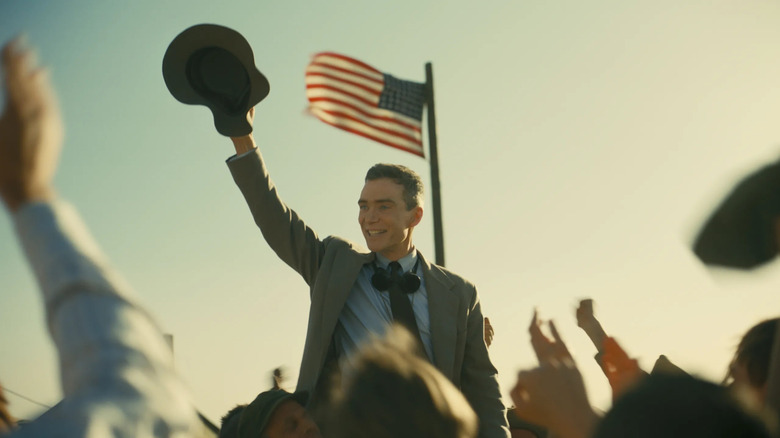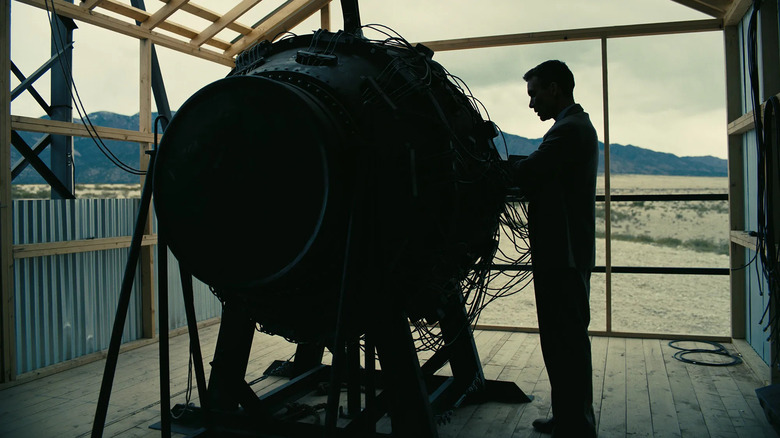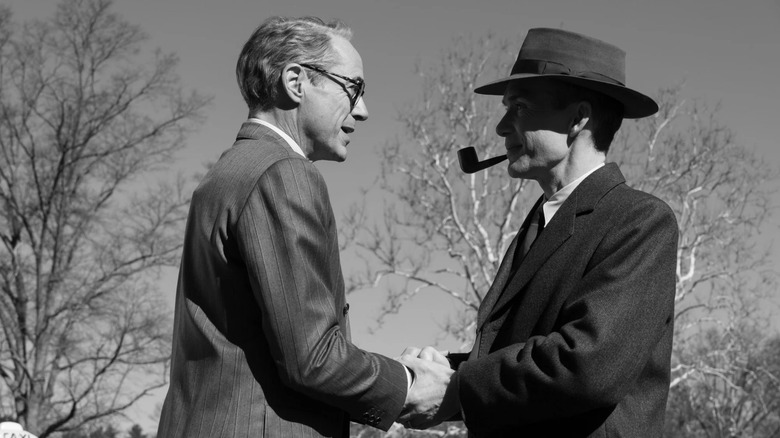The Directors Who Almost Made Oppenheimer Before Christopher Nolan
It's hard to imagine anyone but Christopher Nolan turning a three-hour-long biopic about the inventor of the nuclear bomb into a bona fide blockbuster. In a filmography categorized by spectacle and bombast, with a trilogy of era-defining superhero movies and a string of original blockbusters that are ranked among the best films of the 21st century, Nolan brought a singular focus to the project that few other directors could match with unique and personal touches that reflect his fascinations as a director.
In particular is his dedication to shooting with practical effects, replicating the atomic bomb's deadly plume not with CGI but with analog methods like miniatures, variable frame rates, and practical explosions to turn a massive on-set explosion into something truly apocalyptic. Combined with a script that broke the cliches of traditional biopics, a stellar combination of color and black & white IMAX photography, and the confidence to shoot an epic 3 hour film in under 60 days, he turned this cautionary tale of scientists pushing the bleeding edge of technology too far into the film event of the decade.
But before Nolan got to work rebuilding the Los Alamos research lab in the New Mexico desert, two very different directors were in the running to bring Oppenheimer's story to life: Sam Mendes and Oliver Stone.
Sam Mendes wanted Oppenheimer to be his follow up to Jarhead
Following 1999's "American Beauty" and 2002's "Road to Perdition," director Sam Mendes made "Jarhead," a war film about never going to war. Starring Jake Gylenhaal, the film follows a group of Marines deployed in the Persian Gulf War. The film refuses to indulge in any action spectacle, instead following characters who are frustrated to be relegated to the outskirts of the war without playing much, if any, role in the actual fighting.
Like many other "War on Terror" movies, the film bombed at the box office, although its reputation has risen in the years that have followed. Following the movie's release, Mendes was looking for his next project when he optioned the rights to "American Prometheus" by Kai Bird and Martin J. Sherwin, the 721-page biography on the inventor of the world's first atomic weapons.
The writers of the book thought Mendes' excitement to tackle the project meant they would see their work brought to life, but even though it was fast-tracked for development, the project quickly sputtered out. Mendes would eventually get to make his war movie "1917," but for the writers of "American Prometheus," they lost hope the film would ever escape development hell while the rights to the book passed from one producer to another, who then searched for a director who could tackle this behemoth of a book.
Oliver Stone tried and failed to find 'the essence' of Oppenheimer
With the rights to direct a film based on "American Prometheus" up in the air, the producers searched for a director who wouldn't be afraid of tackling such a weighty subject. Enter: Oliver Stone, the director of controversial war films like "Platoon" and even more controversial biopics like "JFK" and "Nixon." Stone has never shied away from speaking his mind, but even a firebrand like Stone couldn't wrap his head around the prospect of adapting the book.
In the wake of the film's success, Stone revealed that he "turned the project down because I couldn't find my way to its essence." After Stone passed, an adaptation seemed to be fully on ice until New York businessman J. David Wargo purchased the rights himself and pushed for a meeting with Nolan's producing partners. It just so happens that at the same time Wargo made the pitch to Nolan, Nolan already had Oppenheimer on his mind thanks to a gift from "Tenet" star Robert Pattinson of Oppenheimer's speeches.
Nolan came on board to officially adapt the novel, and the rest is history. Stone praised Nolan's "mind-boggling and eye-popping direction," and audiences agreed. The film went on to gross over $1 billion, a number usually reserved for characters dressed in sci-fi gear or superhero capes, not suits and pork pie hats.


